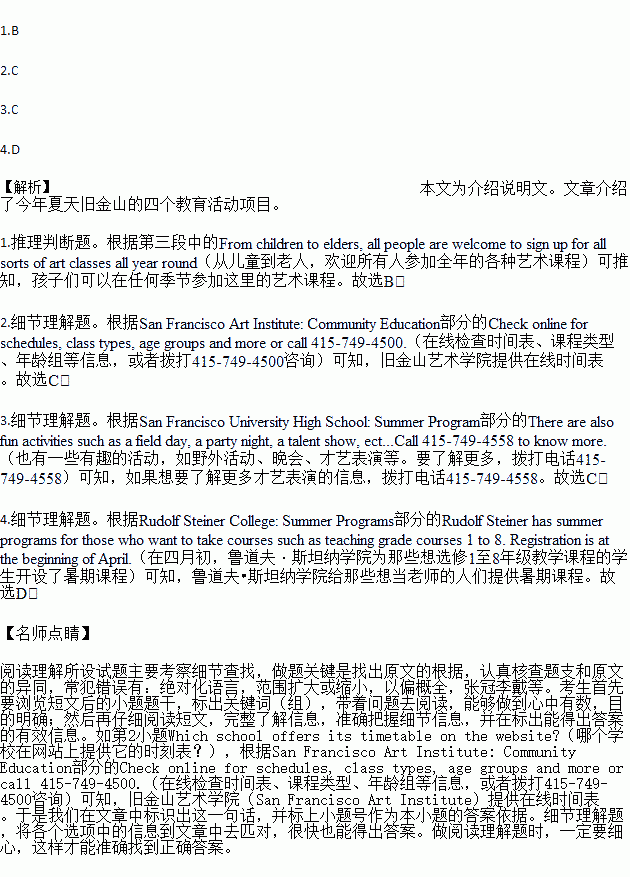题目内容
San Francisco is a great city. Below are some ideas for educational activities and programs in San Francisco for this summer.
The San Francisco School: Summer Programs
There are summer camps for the children from pre-kindergarten through middle school at the San Francisco School. With programs such as “Fearless Writing”, “A Green World” and “Re-Making Clothing”, San Francisco becomes a great place for children to learn and have fun in the summer. Registration starts in the spring. Call 415-749-4550 to know more.
San Francisco Art Institute: Community Education
From children to elders, all people are welcome to sign up for all sorts of art classes all year round, such as “Adult Continuing Education”, “Pre-college Programs” and “A Young Artist”. Check online for schedules, class types, age groups and more or call 415-749-4500.
San Francisco University High School: Summer Program
This is a three-summer commitment and a great program preparing kids for college. It provides language and art classes in the morning and social studies such as sports and history in the afternoon. There are also fun activities such as a field day, a party night, a talent show, ect. 30 to 35 tenth-grade children are chosen each summer, so you have to fill out a form. Call 415-749-4558 to know more.
Rudolf Steiner College: Summer Programs
Rudolf Steiner has summer programs for those who want to take courses such as teaching grade courses 1 to 8. Registration is at the beginning of April. Call 415-749-4560 for more about it.
These activities and programs are usually popular, and if you are interested, get up and join us!
1.What can we know according to paragraph 3?
A. Time for registration is only in summer.
B. Kids can sign up for art classes in any season.
C. The school provides writing lessons for children.
D. Pre-school kids should sign up for classes in spring.
2.Which school offers its timetable on the website?
A. Rudolf Steiner College
B. The San Francisco School
C. San Francisco Art Institute
D. San Francisco University High School
3.If you want to know more about a talent show, you can call ?
A. 415-749-4550. B. 415-749-4500
C. 415-749-4558. D. 415-749-4560.
4.For whom will Rudolf Steiner College provide summer programs?
A. Children from any school.
B. Students from high school.
C. Kids from pre-kindergarten.
D. Those who want to be teachers.


 destroy all those things. Will we use our words to hurt or to heal? The choice is ours.
destroy all those things. Will we use our words to hurt or to heal? The choice is ours.